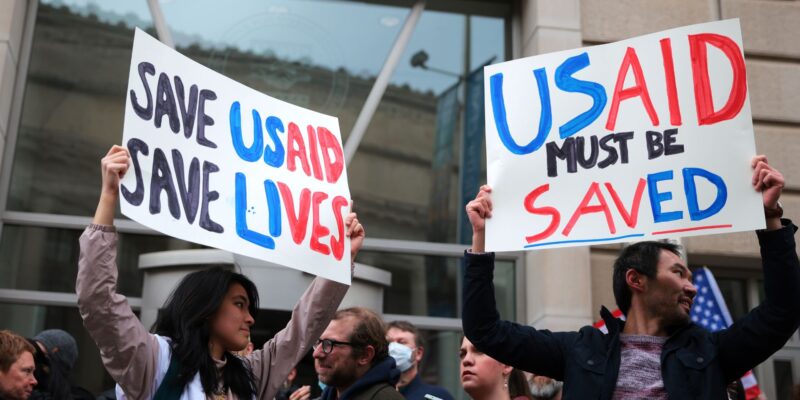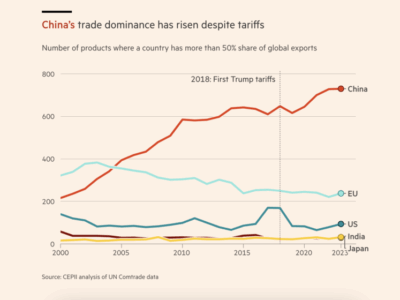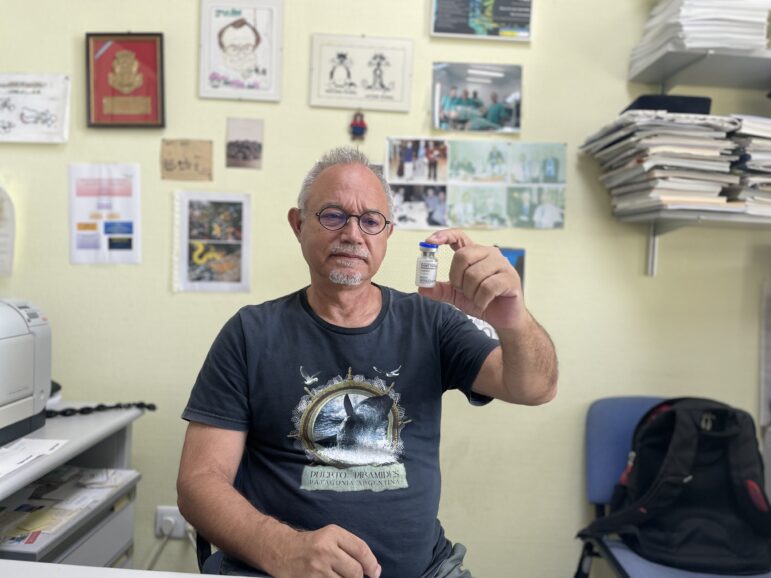
Investigative news organizations across the globe are scrambling to survive and fearing a backlash from authoritarian regimes following the Trump administration’s foreign assistance freeze and other moves to dismantle the U.S. Agency for International Development.
The United States allocated $268 million in 2025 to support independent media and the free flow of information. A USAID fact sheet from 2023 that was on its website before the site went dark on Feb. 1, showed the agency provided funding to more than 700 non-state news outlets and 6,000 journalists, the press freedom group Reporters Without Borders reported.
Autocrats who have long attempted to control the media have cheered the foreign assistance freeze. A spokesman for Russia’s Foreign Ministry described USAID as “a machine for interfering in internal affairs” and “a mechanism for changing regimes.” El Salvador’s president accused USAID of using its funds to “fuel dissent [and] finance protests.” And Iran’s state-run media praised aid cuts that it described as “cutting the budget of foreign-based opposition.”
The Trump administration’s decision “is showing authoritarian regimes: ‘Oh, they closed USAID with such ease, closed their website, made them vanish from history,’” said Rawan Damen, the director of Arab Reporters for Investigative Journalism, which received U.S. foreign assistance. “Maybe they will next say, ‘We are not happy with ARIJ. OK, we can erase them, too.’”
For ARIJ, one of the leading investigative outlets in the Middle East, the aid freeze erased roughly 20% of its budget. Like many other outlets, the abruptness of the funding cuts and accompanying stop-work orders compounded the financial damage. News organizations also incurred expenses in 2024 that have not been reimbursed due to the aid freeze, and had already hired journalists and launched projects on the assumption that they would receive promised U.S. funds in the current year.
“There is total chaos about what this means,” Damen said. “Nobody knows what’s happening, nobody is allowed to speak to anybody.”
We are operating at a time when investigative journalism has never been more important, or more challenged,
— Gerard Ryle, ICIJ’s executive director
ICIJ received a grant from the State Department to build newsroom capacity, which was slated to cover $466,000 in expenses in 2024, and $648,000 in expenses this year. The State Department’s assistance accounted for 6.2% of ICIJ’s expenses in 2024 and 8.6% of its budget in 2025.
“ICIJ will continue to hold the powerful to account no matter what setbacks we might face. We hope that new and existing funders will understand and help us continue in our mission to expose wrongdoing so that the world can make it right,” said Gerard Ryle, ICIJ’s executive director.
“We are operating at a time when investigative journalism has never been more important, or more challenged. Bringing hundreds of the world’s top investigative reporters together to work on cross-border projects is something we have pioneered, and … it will play an even bigger role in protecting the public interest going forward because no one country can stop it.”
The ripple effects of the aid freeze are extensive and also threaten to cripple news organizations that indirectly rely on USAID and State Department support via groups such as the National Endowment for Democracy. The non-governmental organization is funded by the U.S. government and provided $51 million in support to media outlets in 2022, according to a press release.
The Organized Crime and Corruption Reporting Project, an investigative media outlet that also distributes funds to media organizations around the globe, has been forced to make major cutbacks. A spokesperson told ICIJ that 29% of OCCRP’s 2025 operational budget has been frozen, or more than $5 million, and that as a result it has laid off 20% of staff and instituted pay cuts, and that “almost all grants have ended” to local and regional media organizations.
There are multiple court cases underway that challenge the legality of the aid freeze and the dismantling of USAID, and a judge on Friday temporarily blocked the Trump administration’s plans to place 2,200 USAID employees on leave.
Now we have even less money and manpower to do the reporting that was extraordinary to do,
— Attila Biro, co-founder of Romanian outlet Context
Media groups are also organizing in response to the funding freeze. The Global Forum for Media Development has drafted a “call to action” aimed at philanthropies, governments and international institutions, urging them to secure emergency funding to address the media’s financial crisis. The draft letter said that recent events “have severely destabilized the already precarious financial, distribution, and safety conditions of many independent journalism organizations.”
The draft letter also warned that the publication of information about the beneficiaries of media support programs has placed at risk thousands of journalists and human rights defenders who have been involved in U.S.-supported projects. While the letter had been signed by more than 70 media organizations, it said that it would not disclose the signatories “due to security concerns.”
The State Department did not respond to a request for comment for this article. President Donald Trump has said USAID was run by “radical left lunatics,” and on social media accused the organization of funneling money to media organizations “as a ‘payoff’ for creating good stories about the Democrats.” The White House last week specifically cited USAID grants to OCCRP and to train Sri Lankan journalists as examples of wasteful spending by the aid agency.
Some news outlets have already begun to lay off staff and drastically scale back their reporting ambitions. This will mean less coverage of topics that past American administrations prioritized as part of their efforts to promote human rights and democracy abroad.
The Romanian outlet Context has investigated how disinformation shapes the country’s politics. It developed artificial intelligence-based tools to analyze TikTok, and found a massive initiative by the country’s far-right to spread conspiracy theories and Russian propaganda on the platform. Romania’s constitutional court ultimately nullified the nation’s last presidential election and ordered a new vote due to the scale of the electoral manipulation, including on TikTok.
The co-founder of Context, Attila Biro, said that roughly 30% of the outlet’s funding came from U.S. foreign assistance. Without those funds, he said that Context does not have the resources to cover the upcoming election, which has been scheduled for May.
“There’s threats of election interference from Russia and other actors,” said Biro. “And now we have even less money and manpower to do the reporting that was extraordinary to do in any case.”

Ukrainian media, which has received substantial support from the United States, is likely to be decimated by the aid freeze. The Global Forum for Media Development estimates that the United States accounted for 70% to 80% of all foreign media assistance to the country. Mira Milosevic, the forum’s executive director, said most local Ukrainian media outlets “have no budget reserves, and often survive month to month, making them particularly vulnerable.”
The Nikolaev Center for Investigative Reporting, which receives over half of its funding from U.S. foreign assistance, is based in the city of Mykolaiv on the Black Sea and covers news in southern Ukraine. When the Russian army tried to seize Mykolaiv in 2022, the center’s reporters exhaustively catalogued the munitions used in the shelling of their city and the buildings that had been destroyed. Later, they investigated the specific Russian military units that had participated in the assault on Mykolaiv and the names of their commanders.
In addition to alleged Russian war crimes, the center has focused on Ukrainian corruption: A recent investigation uncovered how Ukrainian officials had purchased tens of millions of dollars in property outside the country since the Russian invasion.
The more we create failed states across the world, the more unstable the world becomes,
— Golden Matonga, ICIJ member and director of investigations for a Malawi outlet
The aid freeze casts doubt on the center’s ability to continue this work, said its founder Oleg Oganov. One employee has already quit, he said, and he is pondering whether he can replace some of the staff’s functions with artificial intelligence in the event of further resignations.
“People were shocked at first, and then realized that this turmoil – it is out of their power,” he said. “They can do nothing, we can do nothing.”
Beyond the Ukrainian front lines, U.S.-funded media are sometimes the only investigative outlets in poor countries or fragile democracies. In Malawi, a nation of roughly 20 million people that ranks as one of the poorest nations in the world, private newspapers and radio stations are dependent on a small pool of advertisers, said Golden Matonga, the director of investigations for the Platform for Investigative Journalism and an ICIJ member.
These advertisers include the government and a few large companies, he said, which limits the media’s appetite for investigating them. An investigative media outlet free from the need to raise advertising revenue, he said, “can provide that oxygen of information that cannot be controlled by any other places.”
Malawi is scheduled to hold elections in September, and Matonga is worried that his organization will not have the resources to report on issues like election integrity or governmental corruption. He has already had to cancel team meetings twice due to the lack of clarity around their funding situation, and he fears that the outlet may eventually have to make drastic cutbacks or shut down due to the freeze.
Without the check that independent media can provide on his country’s centers of power, he warns, corruption will spread — both to the detriment of Malawi and the United States. “The more we create failed states across the world, the more unstable the world becomes,” he said. “You have to realize that it’s in the U.S.’s own interest to have a safer, more secure and stable world.”
As of now, Matonga isn’t sure what to tell his staff. “You’re looking at the hunger they have, the energy they have to do this job,” he said. “But you know all that can go away with one email, with one pronouncement in [Washington] D.C. And that is scary, that is overwhelming for people like us.”















